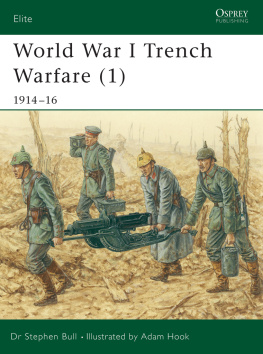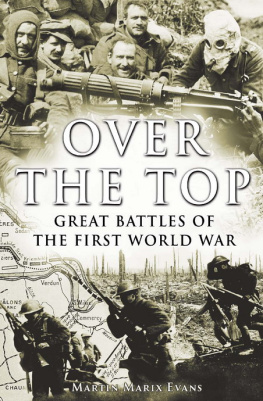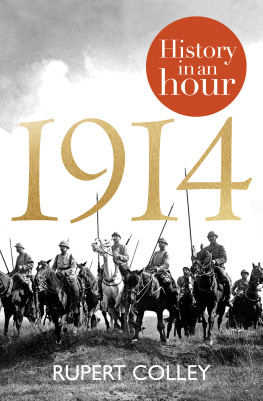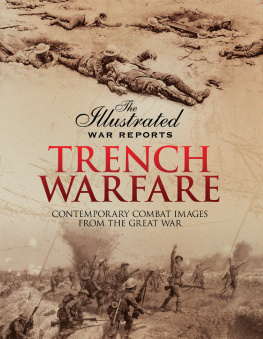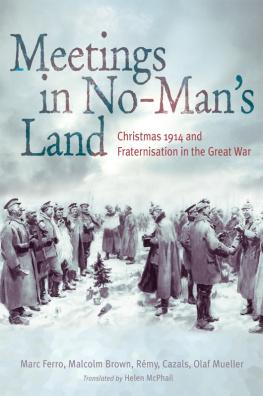THE ILLUSTRATED HISTORY OF
WORLD WAR I
ANDREW WIEST

This digital edition first published in 2014
Published by
Amber Books Ltd
7477 White Lion Street
London N1 9PF
United Kingdom
Website: www.amberbooks.co.uk
Appstore: amberbooksltd
Facebook: amberbooks
Twitter: @amberbooks
Copyright 2014 Amber Books Ltd
ISBN: 978-1-78274-200-5
All rights reserved. With the exception of quoting brief passages for the purpose of review no part of this publication may be reproduced without prior written permission from the publisher. The information in this book is true and complete to the best of our knowledge.
All recommendations are made without any guarantee on the part of the author or publisher, who also disclaim any liability incurred in connection with the use of this data or specific details.

www.amberbooks.co.uk
Related titles available from Amber Books:
History of World War I series (six volumes)
Encyclopedia of Warfare series (seven volumes)
The Vietnam War
CONTENTS
ONE
THE ROAD TO WAR
TWO
GERMANY STRIKES WEST
THREE
THE EASTERN FRONT
FOUR
STALEMATE IN THE TRENCHES
FIVE
THE WIDENING WAR
SIX
SLAUGHTER IN THE WEST
SEVEN
THE FIGHT FOR NAVAL MASTERY
EIGHT
DEFEAT, DESPAIR AND MUTINY
NINE
THE WAR IN THE AIR
TEN
LAST BATTLES
ELEVEN
REPARATION

CHAPTER 1
The Road to War
MANY EUROPEANS GREETED THE OUTBREAK OF THE GREAT WAR WITH ENTHUSIASM, INCLUDING THIS GERMAN CROWD SENDING ITS MEN OFF TO WAR. THE FIRST MODERN, INDUSTRIAL WAR WAS EXPECTED TO BE A QUICK VICTORY THE WORLD DID NOT REALISE THE HORRORS THAT LAY AHEAD.
BISMARCK AND FRANCE
I n some ways World War I can be seen as a continuation of the Franco-Prussian War. Otto von Bismarck, Chancellor of Germany, had used war to unify his country in the 1860s. The final war against France ended in German victory, another French Revolution and the Treaty of Frankfurt. Bismarck had always been careful not to press his victories too far, seeking only to unify his own nation, but with the Treaty of Frankfurt he made critical errors in judgement. Germany seized the disputed border states of Alsace and Lorraine from the French. In addition, the treaty called for a German occupation of France until war reparations had been paid in full. Finally, the Germans proclaimed the founding of the German Empire in a lavish ceremony in the Hall of Mirrors in the Palace of Versailles, the very symbol of French power. Not only had France been defeated, she had been humiliated. The desire for revenge and the redemption of Alsace-Lorraine would later come to dominate French foreign policy. Germany had created a bitter enemy.
Not only had France been defeated, she had been humiliated. The desire for revenge and the redemption of Alsace-Lorraine would later come to dominate French foreign policy. Germany had created a bitter enemy.

OTTO VON BISMARCK, THE ARCHITECT OF GERMAN UNIFICATION, STROVE TO AVOID FUTURE CONFLICT.
OVERVIEW
The aftermath of the Franco-Prussian War of 1870 caused continental Europe to enter into an entangling system of competing military alliances. The alliance groupings, led by Germany and France respectively, were roughly equal in size. Britain had always remained aloof from military alliances, but a near-loss in the Boer War convinced the United Kingdom to rethink its isolationism. Much enmity existed between France and Britain, leaving Germany the logical choice as an alliance partner. However, bumbling diplomacy by Kaiser Wilhelm II forced Britain into an Entente (friendly agreement) with France, thus altering the tenuous European balance of power.
Suddenly tragedy struck, placing the alliance systems at odds. The dramatic assassination of Archduke Franz Ferdinand, the heir to the Austrian throne, served to set in motion a spiral of events that inexorably led to the beginning of the most important war of the twentieth century.
The ever-practical Bismarck set out to limit the scope of his mistake. His goal was to isolate the French diplomatically, curtailing their hopes of a war of revenge, and he did this through a cunning series of diplomatic manoeuvres. He had little to worry about with Britain, which chose its usual isolationist pattern when it came to European politics, and Italy remained a firm friend. Russia and Austria proved more tricky to deal with, for they were often at each others throats over disputes in the Balkans. Austria hoped to expand into the region, while Russia saw herself as the regions Slavic protector, and openly coveted land access to the Dardanelles. Thus, Bismarck was unable to cement alliances with both countries, so he chose the next best thing. Germany signed a military alliance with Austria, and then quickly signed the secret Reinsurance Treaty with Russia. By 1888 all was well in Bismarcks diplomatic world. France was isolated and Germany led the only alliance system on the continent. However, all of Bismarcks careful work was at great risk, for in 1888 Germany crowned a new Kaiser: Wilhelm II.
THE KAISER AND FOREIGN POLICY
T he new Kaiser, unlike his grandfather, would stamp his personality upon the foreign policy of his nation. Wilhelm II was a complex, sometimes comic, man. He was quite vain, possessing more lavish military uniforms than there were days in the year to wear them. The flamboyant Kaiser longed to transform his nation into the pre-eminent power in the world, at that time a position occupied by Great Britain.
As the grandson of Queen Victoria, Wilhelm loved Britain, but he was also intensely jealous of the island nation. The power wielded by Bismarck, and the Chancellors pacific foreign policy, perturbed the Kaiser. As a result, he dismissed Bismarck in 1890, having allowed the Chancellor to remain in office even that long only out of a sense of decorum. The foremost diplomatic genius of German history, and the architect of the Empire was gone, leaving the German ship of state under the control of an inexperienced hothead with grand designs.
THE KAISER
Kaiser Wilhelm II ascended to the throne of Germany in 1888. His parents were Frederick III and the eldest daughter of Queen Victoria. Self-confident and vain, the Kaiser chafed at Bismarcks power, and dismissed the architect of German unification in 1890. Having seized control over most of German foreign policy, the Kaiser began to lead Europe down the road to war. Historians still debate Wilhelms motivations. Did he crave European dominance, or did he merely set into motion a catastrophic series of events that he was unable to control? The Kaiser and his personality are central to the story of the coming of the Great War.
Wilhelm hoped that Germany could supplant Great Britain as the worlds pre-eminent power and thus achieve Germanys place in the sun. To this end, he supported naval and military build-ups which would spark a major arms race and alienate Germany from her potential ally, Great Britain.
Next page




